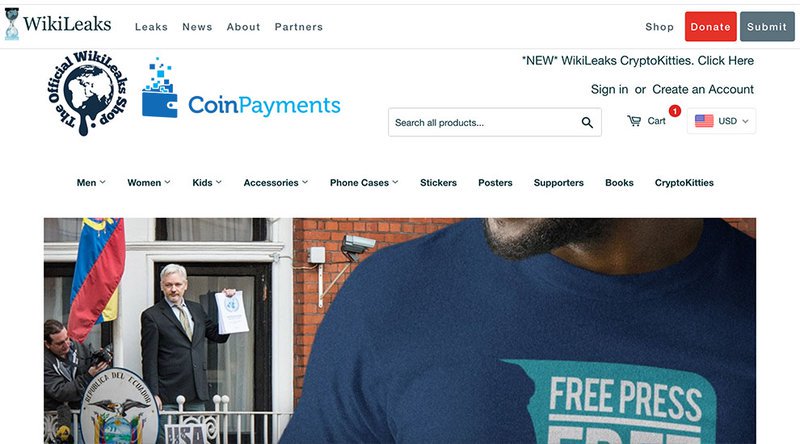WikiLeaks Store Loses Coinbase Support, Still Processing Sales

WikiLeaks has had to find alternative solutions for its online shop. On April 20, 2018, the whistle-blowing document depository revealed in a tweet that Coinbase has shut down the WikiLeaks’ online store account.
Even with Coinbase out as a payment processor, WikiLeaks’ online shop is still able to use CoinPayments.net for cryptocurrency payments, accepting both bitcoin and a variety of altcoins. The organization also still accepts donations in bitcoin, litecoin, ether, monero and zcash.
Coinbase Bails on WikiLeaks
The organization claims that Coinbase sent them a memo “without notice or explanation” indicating that it would no longer have access to the platform.
“Upon careful review,” the message reads, “we believe your account has engaged in prohibited use in violation of our Terms of Service and we regret to inform you that we can no longer provide you with access to our service. We respectfully request that you follow the on-screen instructions presented when you log into your Coinbase account to send any remaining balance offsite to an external address.”
In the message, Coinbase points out that it “is a regulated Money Services Business under FinCEN (FinCen.gov),” making it “legally obligated to implement regulatory compliance mechanisms.” However, the exchange offers no further details on what regulations or Terms of Service WikiLeaks violated to invite a ban.
ANNOUNCE: Coinbase has blocked the official @WikiLeaks shop from its platform without notice or explanation. You can continue to donate #Bitcoin to WikiLeaks at https://t.co/lvhoyhlqUa. #Coinbase #DefendWL #Cryptocurrency #Ethereum #BitcoinCash #ReconnectJulian pic.twitter.com/4BSS023OOk
— WikiLeaks Shop (@WikiLeaksShop) April 21, 2018
Responding to the developments, WikiLeaks tweeted that it will call for an international boycott of Coinbase next week, calling out the exchange “as an unfit member of the crypto community.”
Ironically, WikiLeaks began funding its organization with cryptocurrencies after banks and payment services stopped processing donations to it in November 2010. As Visa, Mastercard, Bank of America, PayPal and Western Union shuttered their support, the renegade group turned to virtual currencies that better conformed to its cypherpunk, anarchist roots.
By December 2016, WikiLeaks had raised 4,000 bitcoin worth roughly $3,000,000 at the time. The flooding of funding was enough to keep WikiLeaks afloat during the blockade, and as Andreas Antonopoulos points out, “Coinbase has repeated history” by effecting the same ban that sparked “many people’s interest in bitcoin.”
We have come full circle. Many people's interest in bitcoin started when Wikileaks was out under an extra judicial embargo by VISA, MC, PayPal and banks. Now Coinbase has repeated history. Oops. https://t.co/b8HQkoOwyQ
— Andreas M. Antonopoulos (@aantonop) April 21, 2018
This article originally appeared on Bitcoin Magazine.


